#I8R Comparisons
Explore tagged Tumblr posts
Text
The Pimp and the Slaver: A Character Comparison and Analysis.
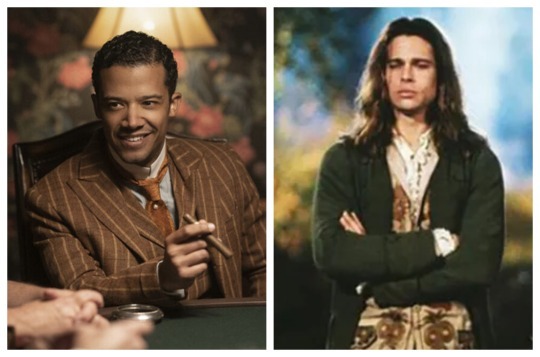
TL:DR - "I think it was a smart and rather aware decision to make AMC's Louis a pimp."
I remember when I first heard that AMC cast a black actor for their "Interview With The Vampire" adaptation. I thought to myself, "how will they reconcile that Louis was the owner of a plantation that profited from slave labor now that the character is black?" While some may argue it wasn't a major plot point or characteristic, you can not argue that it's where Louis spent the majority of his mortal life and the infancy of his vampiric one.

Pictured Above: Okay Alley Plantation where some of the 1994 Interview With The Vampire movie was filmed.
Due to the stereotypes surrounding it, some people may have issues with the word pimp. I would like to give a reminder that, In an occupational context, the word pimp has been used for hundreds of years to refer to:
"A person (especially a man) that controls sex workers, arranges clients for them, and takes a cut of their earnings."
Now, because this is the internet, I feel the need to make it clear that I do NOT think a Pimp is equivalent to a Slaver (though they overlap in many ways). I AM saying that both character's fortunes were made through the exploitation of black bodies.
From here on out I'm going to differentiate between book/movie Louis and series adaptation Louis by calling the former "Book Louis" and the latter "AMC Louis".
Honestly, I should separate book and movie Louis too. I noticed they tried to clean him up a bit in the movie by having him "free" the slaves.
I use the word "free" extremely loosely because he didn't so much free them as he pulled a Michael Scott.
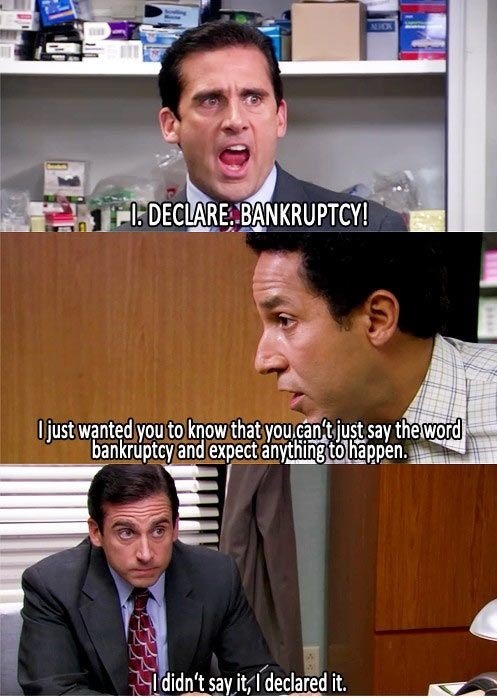
Above: stills from "The Office", and a clip from Interview With The Vampire (1994).
Louis! You cant just say they're free and expect anyone to honor it! There's paperwork to fill out! I mean, what white authority figure is going to roll up to a plantation fire and believe a group of slaves that say "yeh, our master was the devil! He set the house (and probably himself) on fire! oh...and right before, he said we were free!"
The book was far more realistic about this, there Lestat and Louis kill a good amount of them and the ones that weren't killed became runaways or fled to nearby plantations.
"Meantime, Lestat was after the slaves. He would leave such ruin and death behind him no one could make a story of that night at Pointe du Lac, and I went with him. Always before, his ferocity was mysterious, but now I bared my fangs on the humans who fled from me. my steady advance overcoming their clumsy, pathetic speed as the veil of death descended, or the veil of madness. The power and the proof of the vampire was incontestable, so that the slaves scattered in all directions. And it was I who ran back up the steps to put the torch to Pointe du Lac." "Some fifty-five slaves were scattered around the grounds. Many of them would not have desired the life of a runaway and would most certainly go right to Freniere or south to the Bel Jardin plantation down river." -Interview With The Vampire- Part 1
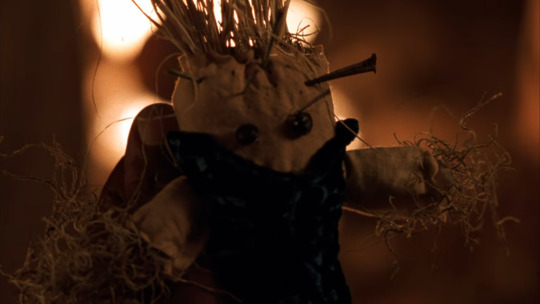
Pictured Above: A Voodoo doll of Lestat: Interview With The Vampire (1994)
Sometimes I think people forget, (or overlook) just how evil Lestat was portrayed in Louis' interview. Not only did he kill the young Freniere and prostitutes, he was said to regularly feed from and killed slaves.
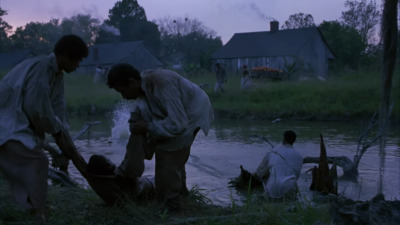
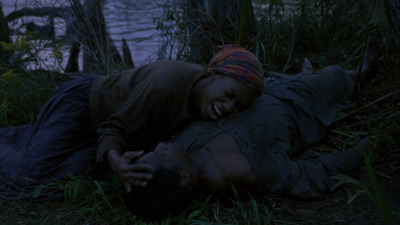
Pictured Above: The deaths of slaves caused by Lestat circa Interview With The Vampire (1994).
"I assure you. That Lestat hunted for mortals every night, I knew. But had he been savage and ugly to my family, my guests, and my slaves, I couldn’t have endured it." "You must understand, Lestat knew this perfectly. Both of us had hunted the Freniere plantation, Lestat for slaves and chicken thieves and me for animals.” -Interview With The Vampire - Part I
When Lestat addresses Louis' interview. He never mentions the enslaved people of Point du Lac, but he does say the following.
"But this is the tale that was told by Louis in Interview with the Vampire, which for all its contradictions and terrible misunderstandings manages to capture the atmosphere in which Claudia and Louis and I came together and stayed together for sixty-five years."
"When he says I played with innocent strangers, befriending them and then killing them, how was he to know that I hunted almost exclusively among the gamblers, the thieves, and the killers, being more faithful to my unspoken vow to kill the evildoer than even I had hoped I would be? (The young Freniere, for example, a planter whom Louis romanticizes hopelessly in his text, was in fact a wanton killer and a cheater at cards on the verge of signing over his family's plantation for debt when I struck him down. The whores I feasted upon in front of Louis once, to spite him, had drugged and robbed many a seaman who was never seen alive again.) But little things like this don't really matter. He told the tale as he believed it." -The Vampire Lestat: Epilogue Interview With The Vampire
To me, this means "the slaves I killed deserved it and the ones that didn't...well, no one is perfect!" Which is understandable and pretty on brand for Lestat.

Above: Tom Cruise as Lestat: Interview With The Vampires (1994)
Going back to Louis telling "the tale as he believed it", I honestly think his "monster of a memory", dramatizations, and misremembering's are just Anne's attempt to redeem Lestat. When originally writing IWTV, Lestat was going to (officially) die in the fire that engulfed him before Louis and Claudia leave America. She ended up writing him back into the story and falling in love with his character, turning him into the brat prince we all know and love. It makes me think that that in order to mold Lestat into who she wanted him to be, rather than the villain she originally wrote, she threw Louis under the bus. That's just an opinion tho!

On to AMC Louis.
I think it was a smart and rather aware decision to make AMC Louis a pimp. Both AMC and Book Louis profit from the mistreatment of others. This consistency allows some the ignorance, hypocrisy, and irony of the book character to remain even though there was a change in race and there for his social status and privilege. During Lestat's recounting, he describes many aspects of Louis' personality. At one point he says the following:
"He was, after all, a discriminating and inhibited child of the middle class, aspiring as all the colonial planters did to be a genuine aristocrat though he had never met one..." -The Vampire Lestat: Epilogue Interview With The Vampire
This statement rings true for both Book Louis and AMC Louis despite their different cultural, racial, and generational backgrounds. Due to their occupations as a "planter" and pimp respectively, there is an innate ironic undertone that comes from listening to someone express their melancholy, depression, and self suffering knowing their lifestyle was build of the backs of broken bodies.

Side Note: I think of this line from "Hamilton" whenever Book Louis is referred as a "planter".
On that note, I feel there was (some) redemption for Louis as a character in season 1 of AMC's IWTV. This came in the form of his confession and the awareness of what he had done. At no point in the book does Louis reflect on any of the pain, hurt, or exploitation of the people who served Pointe du Lac. Louis (both in book and film) is known for many things, but taking accountability has never been one of them!
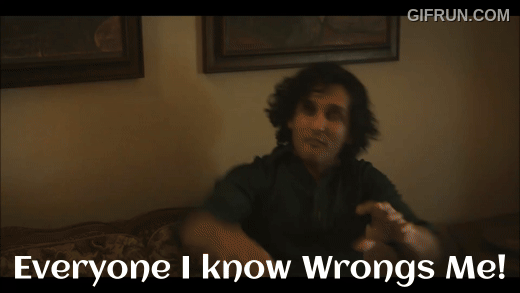
Armand doing a spot on impression of Louis. (AMC's IWTV S2)
However, in (what I believe to be) the best scene in S1, Louis takes accountability! It's one of the (many) reasons I tend like AMC Louis over Book Louis. He isn't just a shell of a person, a bystander. He's appears deeper and more complex. This Monologue has so many contextual, cultural, and religious conversation pieces within it. It was masterfully written and performed.
"Bless me father for I have sinned. Grievously, sinned. I'm a drunk Lord, I'm a liar, I am a thief, Lord. I profit off the misery of other men, and I do it easy. Drugs, liquor, women. I loiter men and grab what they got. I take daughters with no homes and I put them out on the streets, Lord. And I lie to myself saying that I'm giving them roof, and food, and dollar bills in their pocket, but I look in the mirror and I know what I am. The big man in the big house stuffing cotton in my ears so I can't hear their cries. And Lord, I dragged my family into this mess with me. I shame my father. I failed my brother. I lost my mother and sister, and rather than fix it like a man should, Lord, I run, like a coward. I run to the bottle. I run to the grift. I run to bad beds...."
youtube
In this next comparison, contrary to the last, I believe AMC Louis actions were more deplorable than Book Louis. In both telling's, Louis empire comes crashing down in a fiery blaze. In the book, those enslaved at Point du Lac being to rise against Lestat and Louis, sensing that they are inhuman. Louis suggests they leave before a full revolt breaks out but Lestat refuses while throwing hella insults at Louis...
"You whining coward of a vampire who prowls the night killing alley cats and rats and staring for hours at candles as if they were people and standing in the rain like a zombie until your clothes are drenched and you smell like old wardrobe trunks in attics and have the look of a baffled idiot at the zoo." -Lestat, Interview With The Vampire: Part I
I mean, what he said was true, but jeeez Lestat, tell 'em how you really feel why don't you!
Things come to a head resulting in the massacre and fire at Pointe du Lac. In this telling, Louis attempted to flee before things became bloody and out of control. Once shit hit the fan, he more or less gives up.
"because I had had enough of Pointe du Lac and Lestat and all this identity of Pointe du Lac’s prosperous master. I would torch the house, and turn to the wealth I’d held under many names, safe for just such a moment." Interview With The Vampire: Part 1
I give him credit here because it was never Louis' intention to cause harm or destruction. In this case (according to Louis anyway) it was Lestat's carelessness and stubbornness that lead to murmurings of a revolt and the deaths that followed. Yes, I'm defending Book Louis a little because he at least had awareness of how bad things could be and attempted to subvert it. AMC Louis on the other hand? He poured gas on the fire.

Pointe du Lac in flames: Interview With The Vampire (1994)
The fall of AMC Louis' empire was a hard watch for me. It's was incredibly frustrating because (as a black man) he should know better. He knows that his actions affect the black population around him. At that time (and still) minorities are seen as a monolith. When one fails, we ALL take the blame. You still see this regularly in the media. When a member of the majority commits an atrocity It is a reflection on that person (and maybe their family). But when a minority does the same, its all of them. It's causes a mass reinforcement of harmful stereotypes that hurts everyone in the community. In the worst cases it causes cities to burn and innocent lives to be lost.

Pictured above: Louis attacking Alderman Fenwick. AMC IWTV Season 1 Episode 3
Now, when I make posts like this, I often go back and rewatch things objectively to see if I still feel how I feel. And I do. In fact, Lestat and I feel the same.



Pictured Above: Stills from IWTV Season 1 Episode 3.
Right!? It's 1922! People were being lynched and burned for FAR less than murder. Quoting Lestat again:

Pictured Above: Stills from IWTV Season 1 Episode 3.
This was purely insecurity and selfishness. This was Louis feeling slighted and wanting his get back. Even if he had killed Fenwick and left it at that, I could let it go...MAYBE. But to display the body like that with the "White's Only" sign? He knew what would happen, he may not have been consciously thinking about it, but he can't feign naivety. This was self destruction, much like Book Louis setting fire to Pointe du Lac (and not even much different than Armand's self destructiveness). And, just like in the book, the black souls around him were collateral. While he was able to cut his losses, those he subjugated were left to die and suffer.

Above: A dead Alderman Fenwick.
Note: I am not discounting what happened to Louis. He was swindled, and understand his pent up frustrations, I do. It just doesn't justify his actions for me. At the end of the day this was over money and power. I'm gonna quote Lestat one more time:
Lestat: We don't need the money. Louis: It's not about that. You think I'm gon' let that snake bite me and my people? Lestat: You have your investments on the Claiborne Avenue. Louis: What, hats? Little grocery stores? Nickels, dimes, quarters. Lestat: So, it is about the money.

In conclusion, I LOVE drawing comparisons between the book and series. It shows how you can change a story on a variety of levels, while keeping the integrity of the characters and plot. Brava to the writers and cast. You give me so much to think and write about!

#character analysis#amc interview with the vampire#interview with the vampire#Youtube#louis de pointe du lac#I8R Shows#I8R Comparisons
60 notes
·
View notes
Text
If you think what Santiago (said he) did with Claudia's ashes was bad? At least she was dead for it. Lets talk about what Armand did!
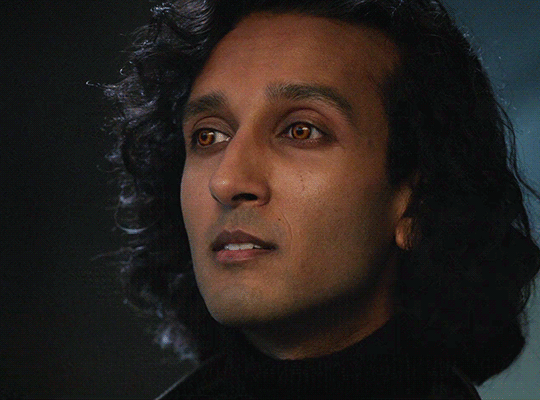
In part 2 of "The Vampire Armand" he finally begins to recount what happened in "Interview With The Vampire". If you haven't read the book, I dunno if you're ready for this!
"Let me say only that before she was shoved out into a brick-lined air well to await the death sentence of the god Phoebus, I tried to grant her fondest wish, that she should have the body of a woman, a fit shape for the tragic dimension of her soul."
Okkkaaayyy....

"Well, in my clumsy alchemy, slicing heads from bodies and stumbling to transplant one to another, I failed."
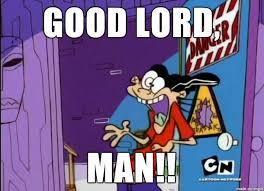
"Ah, what a grand disaster was that, the child-headed monster woman unable to speak, dancing in a frenetic circle, the blood gurgling from her shuddering mouth, her eyes rolling, arms flapping like the broken bones of invisible wings."

"It was a truth I vowed to conceal forever from Louis de Pointe du Lac and all whoever questioned me.... As for the others, my stupid cynical flock, who listened so lasciviously at my door to the screaming, who maybe guessed the extent of my failed wizardry, those vampires died by Louis's hand."
He's lucky that wasn't in the show. Imagine what AMC's Louis would do if he ever found this out. That wall slam would be a welcome trade off! lol!
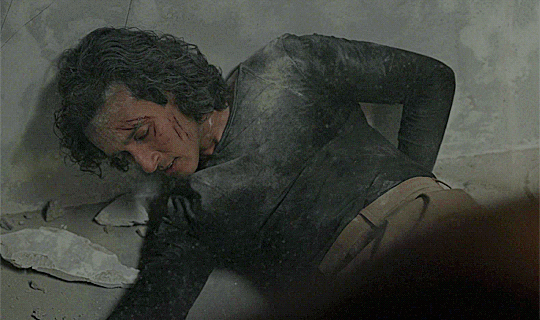
#interview with the vampire#amc interview with the vampire#character comparison#I8R Comparisons#armand#the vampire armand
22 notes
·
View notes
Text
I forgot I did this. Yes, it was a middle of the night project lol. (I suggest watching it full screen.)
TOHO's production of Elisabeth das Musical
Left: Yu Shirota (White Version)
Right: Inoue Yoshio (Black Version)
13 notes
·
View notes
Text
Kissed By Death vs. Kissing Death

Trigger Warning: This Post Contains Discussions and Depictions of Suicide.
Warning: Spoilers for "Elisabeth Das Musical"
This should come as no surprise, but I enjoy different variations of the same story. The most subtle differences can change things resulting in a different interpretation.
The performance inspiring this post is the 2016 Japanese production of “Elisabeth das Musical” staring Yuu Shirota as Der Todd (death) and Furukawa Yuta as Prince Rudolph. The scene: Mayerling Waltz.
In act 2, Rudolph commits suicide at the imperial hunting lodge in Mayerling. This production differentiates itself from others by having Prince Rudolph kiss death rather than death kissing Rudolph. Not only that, but Rudolph independently pulls the trigger rather than in tandem with Der Todd. I thought this was a fantastic artistic choice.

Above: A 2006 production of Elisabeth das Musical
It’s subtle, but REALLY drives home that Rudolph made a conscious decision to end his own life. He holds the gun, thinks about it, then embraces death, taking the kiss for himself. This is a departure from the standard portrayal where death is often seen holding the gun along with Rudolph (sometimes forcing it into his hands) and stealing the kiss just seconds before the gun goes off. Both renditions tell the story of suicide, showing the manic franticness and fear of a person about to make a life ending decision. However, that last part, being kissed by death vs kissing death gives different a slightly different meaning.
Below I have some scenes for comparison (after MUCH trial and error due to tumblr only allowing one upload per post.) -_-
This first clip is from the 2005 Austrian production at the Theater an der Wien staring Máté Kamarás as Der Todd and Johann Ebert as Rudolph.
vimeo
This second clip is from the 2009 Belgium production in Antwerp staring Oliver Arno as Der Todd and Thomas Hohler as Rudolph.
vimeo
Finally the 2016 Japanese production of “Elisabeth das Musical” staring Yuu Shirota as Der Todd (death) and Furukawa Yuta as Prince Rudolph.
There's a peace there, a release, a forfeit. He fought for as long as he could, but then he just didn't want to fight anymore.
In the typical portrayal of this scene, it seems (to me) that Rudolph's death is rash, impulsive, and he is unsure until the end. Which is also much closer to the historical truth btw.
In refence to the personification of death, there is also the implication that, although Rudolph is suicidal, death is making the ultimate decision, pushing and (in some productions) even forcing Rudolph to kill himself. It makes it as though Der Todd killed Elisabeth's son, which again, in the context of personifying death is a metaphor.
This may not be the last you see of Elisabeth das Musical from me, I'll leave you with a 17mintue comparison compilation I found on YouTube:
youtube
15 notes
·
View notes
Text
The Cold Is My Price For Freedom

I've listened to "Let It Go" in many different languages. My favorite BY FAR is the French version. When I saw "Frozen" in theaters, I remember thinking how powerful that entire scene was. When hearing Libérée, Délivrée, that feeling multiplied! The lyrical changes made are powerful and allow us to see this familiar scene in a new way. I identify with this version a lot and I hope to give you a new song to add to your playlist!
Here are the French lyrics translated into English along with the official version on YouTube:
Winter Moves softly in the night The snow is queen in it's right A Kingdom of solitude My place is here, forever The wind that blows on me doesn't think about tomorrow It is far too strong I've struggled in vain
Hide your powers, don't speak of them Pay attention, the secret will carry on No misgivings, no torments of feelings
Liberated, delivered I will never lie again Liberated, delivered It's decided, I'm leaving I left my childhood in summer Lost in winter The cold is the price for my freedom
When you take the high ground Everything seems insignificant Sadness, anguish, and fear Left me a long time ago
I want to see what I can do With this magic replete with mystery Good or bad, I say neverminded Nevermind
Liberated, Delivered The stars fill up my arms Liberated, delivered No, I am not crying Here I am, yes, here I am Lost in winter
My power comes from the sky and overwhelms the space My soul expresses itself in drawing and sculpting in the ice And my thoughts are flowers made of frozen crystal I will not return The past is in the past
Liberated, delivered From now on nothing is stopping me Liberated, delivered No more princess perfect I am here, like I've dreamt Lost in winter The cold is my price for freedom
youtube
6 notes
·
View notes
Text
"Elisabeth" Side by Side:
I suggest watching full screen
Left: Yu Shirota as death and Ikusaburo Yamazaki as Lucheni
Right: Yoshio Inoue as death and Songha as Lucheni
19 notes
·
View notes